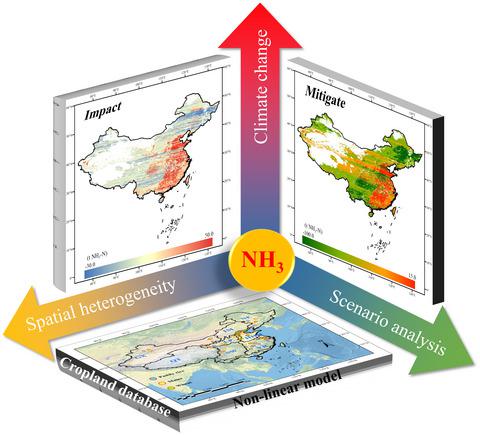当前位置:
X-MOL 学术
›
Glob. Change Biol.
›
论文详情
Our official English website, www.x-mol.net, welcomes your
feedback! (Note: you will need to create a separate account there.)
Climate change may interact with nitrogen fertilizer management leading to different ammonia loss in China’s croplands
Global Change Biology ( IF 10.8 ) Pub Date : 2021-09-03 , DOI: 10.1111/gcb.15874 Xiangrui Xu 1 , Xiao Ouyang 1 , Yining Gu 1 , Kun Cheng 1 , Pete Smith 2 , Jianfei Sun 1 , Yunpeng Li 1 , Genxing Pan 1
Global Change Biology ( IF 10.8 ) Pub Date : 2021-09-03 , DOI: 10.1111/gcb.15874 Xiangrui Xu 1 , Xiao Ouyang 1 , Yining Gu 1 , Kun Cheng 1 , Pete Smith 2 , Jianfei Sun 1 , Yunpeng Li 1 , Genxing Pan 1
Affiliation

|
Despite research into the response of ammonia (NH3) volatilization in farmland to various meteorological factors, the potential impact of future climate change on NH3 volatilization is not fully understood. Based on a database consisting of 1063 observations across China, nonlinear NH3 models considering crop type, meteorological, soil and management variables were established via four machine learning methods, including support vector machine, multi-layer perceptron, gradient boosting machine and random forest (RF). The RF model had the highest R2 of 0.76 and the lowest RMSE of 0.82 kg NH3-N ha−1, showing the best simulation capability. Results of model importance indicated that NH3 volatilization was mainly controlled by total input of N fertilizer, followed by meteorological factors, human managements and soil characteristics. The NH3 emissions of China's cereal production (paddy rice, wheat and maize) in 2018 was estimated to be 3.3 Mt NH3-N. By 2050, NH3 volatilization will increase by 23.1−32.0% under different climate change scenarios (Representative Concentration Pathways, RCPs), and climate change will have the greatest impact on NH3 volatilization in the Yangtze river agro-region of China due to high warming effects. However, the potential increase in NH3 volatilization under future climate change can be mitigated by 26.1−47.5% through various N fertilizer management optimization options.
更新日期:2021-11-12











































 京公网安备 11010802027423号
京公网安备 11010802027423号